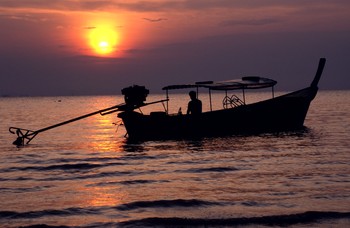Baptism of the Lord
Fr. Charlie Dittmeier
January 13, 2013
Isaiah 42:1-4, 6-7; Psalm 29:1-2, 3-4, 3, 9-10; Acts 10:34-38; Luke 3:15-16, 21-22
A characteristic of our modern world seems to be the enormous amount and the rate of change we experience. Change has always been with us, but because of increased travel and contact, the Internet and improved communications, social media, the globalization of our economies and politics; and because of the increasing influence we have on our environment and societies through design and neglect, change is much more in the forefront of our thinking.
Some change is personal. We choose to get married and start a family. We choose to relocate to another city for a better job. We choose to buy a new car. Other change is more global, on a macro scale. The Arab Spring started in Tunisia without a master plan but effected change throughout North Africa and the Middle East. A tsunami in Japan wrought changes in Japanese society that will be felt for a generation and affected attitudes toward nuclear power around the world. Climate change is sometimes quietly, sometimes dramatically affecting environments and livelihoods and lifestyles.
But whether change is personal or global, it is something we as Christians cannot ignore. Increasingly, as we become aware of our role in creation and in society and of our power to create change, we must see change as an element of our spirituality. We must begin to articulate a new way of being in our world and in our relationships with God and with each other.
That is what happened to Jesus at his baptism. He had apparently lived a simple life with his parents in Nazareth, a man of prayer who took seriously the scriptures read in the synagogue. On the Sabbath he heard Isaiah say:
I am the Lord, I have called you in righteousness, I have taken you by the hand and kept you; I have given you as a covenant to the people, a light to the nations, to open the eyes that are blind, to bring out the prisoners from the dungeon, from prison those who sit in darkness.
In his prayer and in the scriptures, he recognized the call of the Holy Spirit and through his baptism by John, he heard himself confirmed as the Christ by the voice of the Father that came from the heavens. “God anointed [him] with the Holy Spirit and with power … [He] went about doing good and healing all who were oppressed by the devil, for God was with him.”
This is our call, too. We too are to be people of prayer. We too are to be formed and guided by the scriptures. We too are to take seriously our baptism. We too are to find a new way of being and a new way of offering God’s life and love in the places where we live.
Cambodia is a country that needs a new way of being. It has experienced the ravages of decades of war and seen the destruction of its infrastructure and its population. An educated generation lost to the Khmer Rouge has not been replaced, and the government in place is too often venal and corrupt.
Other countries are in much the same situation. Unfortunately as they try to rebuild it is too easy to follow false prophets of greed and consumerism, unsustainable models of development and environmental degradation, and buy into unjust systems that have caused so much pain and suffering in the developed world. These developing countries need good guides and models to lead them into a sustainable future of justice, peace, equity, with a harmony between humanity and our natural environment.
If we take seriously our baptism as Jesus did, we can offer a new way of being in the world today. First we must live that new way of being ourselves, changing ourselves to be the people God calls us to be, relating in ways that offer more life and love and integrity. We can learn to live with less so that all will have what is sufficient.
And then we can offer to others models of relationships of inclusion and justice, of trust and respect. We can bring just and equitable ideas and approaches that we have accepted ourselves and offer them to others for development. We can encourage the women and men of vision and courage to stand against the prevailing powers of destruction in their countries.
It has become something of a cliché but Mahatma Gandhi’s encouragement to “be the change you wish to see in the world,” is another way of saying that now we must find a new way of being in the world and support those working for change.

